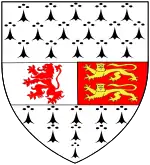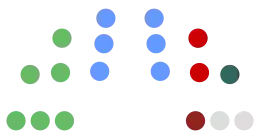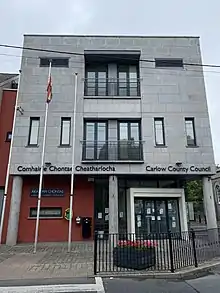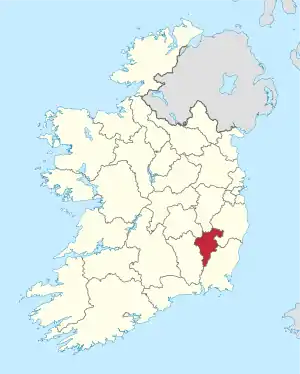Carlow County Council
Carlow County Council (Irish: Comhairle Chontae Cheatharlach) is the authority responsible for local government in County Carlow, Ireland. As a county council, it is governed by the Local Government Act 2001. The council is responsible for housing and community, roads and transportation, urban planning and development, amenity and culture, and environment.[1] The council has 18 elected members. Elections are held every five years and are by single transferable vote. The head of the council has the title of Cathaoirleach (chairperson). The county administration is headed by a Chief Executive, Kathleen Holohan. The county town is Carlow.
Carlow County Council Comhairle Chontae Cheatharlach | |
|---|---|
 | |
 | |
| Type | |
| Type | |
| Leadership | |
Andrea Dalton, FF | |
| Structure | |
| Seats | 18 |
 | |
Political groups |
|
| Elections | |
Last election | 24 May 2019 |
| Meeting place | |
 | |
| County Buildings, Athy Road, Carlow | |
| Website | |
| Official website | |

History
Originally Carlow Courthouse was the meeting place of Carlow County Council.[2] The county council established their County Secretary's Office at 1 Athy Road in the former offices and printing works of the Carlow Sentinel which ceased publication after the First World War.[3][4] The county council subsequently moved further north along Athy Road into modern premises which are now known as the County Buildings.[5]
Under the Local Government Act 2001, Carlow County Council was allocated 21 seats.[6] In November 2012, Phil Hogan, the Minister for the Environment, Community and Local Government, appointed a Local Electoral Area Boundary Committee to review the allocation of seats and the local electoral areas across local authorities. In the case of Carlow County Council, it recommended an decrease to 18 seats.[7] This was implemented by the Local Government Reform Act 2014.[8] In addition, the town councils of Carlow and Muinebheag were abolished, with their functions transferred to the County Council.[9]
Regional Assembly
Carlow County Council has two representatives on the Southern Regional Assembly who are part of the South-East Strategic Planning Area Committee.[10]
Local electoral areas and municipal districts
Carlow County Council is divided into the following local electoral areas, defined by electoral divisions, each of which also forms a municipal district.[11]
| LEA and Municipal District | Electoral divisions | Seats |
|---|---|---|
| Carlow | Ballinacarrig, Burton Hall, Carlow Rural, Carlow Urban, Graigue Urban and Johnstown. | 7 |
| Muine Bheag | Agha, Ballyellin, Ballymoon, Ballymurphy, Borris, Clogrenan, Coonogue, Corries, Fennagh, Garryhill, Glynn, Killedmond, Kyle, Leighlinbridge, Marley, Muinebeag Rural, Muinebeag Urban, Nurney, Oldleighlin, Rathanna, Rathornan, Ridge, Sliguff and Tinnahinch. | 5 |
| Tullow | Ballintemple, Ballon, Clonegall, Clonmore, Cranemore, Grangeford, Hacketstown, Haroldstown, Kellistown, Kilbride, Killerrig, Kineagh, Myshall, Rahill, Rathrush, Rathvilly, Shangarry, Tankardstown, Templepeter, Tiknock, Tullow Rural, Tullow Urban, Tullowbeg and Williamstown. | 6 |
Current Councillors
The following were elected at the 2019 Carlow County Council election.
| Party | Seats | |
|---|---|---|
| Fianna Fáil | 6 | |
| Fine Gael | 6 | |
| Labour | 2 | |
| Sinn Féin | 1 | |
| PBP–Solidarity | 1 | |
| Independent | 2 | |
Councillors by electoral area
This list reflects the order in which councillors were elected on 24 May 2019.
| Council members from 2019 election | |||
|---|---|---|---|
| Local electoral area | Name | Party | |
| Carlow | Fintan Phelan | Fianna Fáil | |
| Andrea Dalton | Fianna Fáil | ||
| Fergal Browne | Fine Gael | ||
| Ken Murnane | Fianna Fáil | ||
| Tom O'Neill | Fine Gael | ||
| John Cassin | Independent | ||
| Adrienne Wallace[lower-alpha 1] | Solidarity–PBP | ||
| Muine Bheag | Tommy Kinsella | Fine Gael | |
| Willie Quinn | Labour | ||
| Andy Gladney | Sinn Féin | ||
| Michael Doran | Fine Gael | ||
| Arthur McDonald | Fianna Fáil | ||
| Tullow | John Pender | Fianna Fáil | |
| Charlie Murphy | Independent | ||
| Brian O'Donoghue | Fine Gael | ||
| William Paton | Labour | ||
| John Murphy | Fine Gael | ||
| John McDonald | Fianna Fáil | ||
Notes
- Solidarity–People Before Profit was renamed as People Before Profit–Solidarity in June 2021.
References
- "All Services". Carlow County Council. Archived from the original on 19 November 2010. Retrieved 17 March 2011.
- "History of the Carlow Regional Technical College and the Institute of Technology, Carlow" (PDF). Carloviana. 2010. p. 61. Archived (PDF) from the original on 22 December 2017. Retrieved 26 October 2019.
- "Dublin Street 1985". Ireland Genealogical Projects. Archived from the original on 12 November 2019. Retrieved 12 November 2019.
- Tracy, Alice (1 December 1953). "The Story of Athy Road" (PDF). Carloviana. p. 30. Archived (PDF) from the original on 22 December 2017. Retrieved 12 November 2019.
- "Local Authorities". Oireachtas. 26 May 1982. Archived from the original on 26 October 2019. Retrieved 26 October 2019.
- Local Government Act 2001, 7th Sch.: Number of members of local authorities (No. 37 of 2001, 7th Sch.). Enacted on 21 July 2001. Act of the Oireachtas. Retrieved from Irish Statute Book.
- "Local Electoral Area Boundary Committee Report 2013" (PDF). Local Electoral Area Boundary Committee. 29 May 2013. p. 23.
- Local Government Reform Act 2014, s. 15: Number of members of local authorities (No. 1 of 2014, s. 15). Enacted on 27 January 2014. Act of the Oireachtas. Retrieved from Irish Statute Book.
- Local Government Reform Act 2014, s. 24: Dissolution of town councils and transfer date (No. 1 of 2014, s. 24). Enacted on 27 January 2014. Act of the Oireachtas. Retrieved from Irish Statute Book on 21 May 2022.
- Local Government Act 1991 (Regional Assemblies) (Establishment) Order 2014, Article 5 and Schedule 3 (S.I. No. 573 of 2014). Signed on 16 December 2014. Statutory Instrument of the Government of Ireland. Retrieved from Irish Statute Book on 20 April 2023.
- County of Carlow Local Electoral Areas and Municipal Districts Order 2018 (S.I. No. 610 of 2018). Signed on 19 December 2018. Statutory Instrument of the Government of Ireland. Archived from the original on 6 May 2021. Retrieved from Irish Statute Book on 19 January 2019.